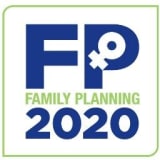
Family Planning 2020 (FP2020)
About
FP2020 works with governments, civil society, multilateral organizations, donors, the private sector, and the research and development community to enable 120 million more women and girls to use contraceptives by 2020.
FP2020 is an outcome of the 2012 London Summit on Family Planning where more than 20 governments made commitments to address the policy, financing, delivery and socio-cultural barriers to women accessing contraceptive information, services and supplies and donors pledged an additional US$2.6 billion in funding. Since then, the number of countries with FP2020 commitments has grown to 36 and, in 2014 alone, donors provided US $1.4 billion in bilateral funding for family planning—32 percent more than in 2012.
Led by an 18-member Reference Group, operated daily by a Secretariat, and hosted by the United Nations Foundation, FP2020 is based on the principle that all women, no matter where they live should have access to lifesaving contraceptives.
The vision is for FP2020 to serve as an inclusive and results-oriented partnership that is working with a diverse group of stakeholders and experts to accelerate action and to address the most significant global and country-level barriers to progress against FP2020 goals. With the backing and participation of our leadership and the global family planning community, we are ready for the challenges and opportunities that lie ahead.
FP2020 adheres to the following principles to support the goal of reaching 120 million additional women by 2020:
- Protection of the human rights of women and girls including through policies and mechanisms to ensure informed choice of a broad range of high-quality, safe, effective, acceptable and affordable contraceptive methods; non-discrimination, and assurance that women and girls are fully informed, and not coerced by any means.
- Integration of family planning within the continuum of care for women and children (including HIV-related services); and development of mechanisms that address barriers to access to affordable and high-quality information, supplies and services for family planning, yet are adaptable and can be expanded to meet a broader set of unmet health and development needs of women and children.
- Universal access to voluntary contraceptive information, services and supplies, within the context of integrated programs to achieve sexual and reproductive health and rights and the health-related MDGs.
- Equity in policies and program design and implementation, such as the removal of policy and financial barriers and the development of public and private delivery mechanisms, so that the poorest and most vulnerable women and girls have ready access to affordable, high-quality family planning information, supplies and services.
- Empowering women to decide whether and when they wish to become pregnant as well as how many children they wish to have.
- Participatory development of country plans based on consultations with, and the views of, all stakeholders, especially poor and marginalized girls and women.
- Strong partnerships among and between a broad base of stakeholders—community, governments, political leaders, civil society organizations (including faith-based organizations), the private sector, donors and multilaterals—to help ensure high-quality service delivery, outreach to more disadvantaged groups, building community support and program accountability to the people served.
- Commitment to results, transparency and accountability to ensure countries and the global community track progress towards results, as well as monitoring and assessing protection of human rights and the extent to which the poor and marginalized women and adolescent girls are reached.
Where we work
Family Planning 2020 aims to expand access to family planning information, services, and supplies to an additional 120 million women and girls in 69 of the world’s poorest countries by 2020.
Partners
FP2020 partners with our four Core Partners, more than 45 government commitment makers, 23 implementing partner organizations, and research and private sector partners to propel our movement and progress.
Core Partners
- The Bill & Melinda Gates Foundation is guided by the belief that every life has equal value and works to help all people lead healthy, productive lives. In developing countries, it focuses on improving people’s health and giving them the chance to lift themselves out of hunger and extreme poverty.
- The Department for International Development (DFID) leads the UK’s work to end extreme poverty by creating jobs, unlocking the potential of girls and women and helping to save lives when humanitarian emergencies hit.
- UNFPA, the United Nations Population Fund, delivers a world where every pregnancy is wanted, every birth is safe, every young person's potential is fulfilled. UNFPA works to achieve universal access to sexual and reproductive health (including family planning), promote reproductive rights, reduce maternal mortality and accelerate progress on the ICPD agenda and MDG 5.
- USAID carries out U.S. foreign policy by promoting broad-scale human progress at the same time it expands stable, free societies, creates markets and trade partners for the United States, and fosters good will abroad. U.S. foreign assistance has always had the twofold purpose of furthering America's interests while improving lives in the developing world.



Company Offices
- United States (headquarters)
- Washington, DC
- 1750 Pennsylvania Avenue, Suite 300